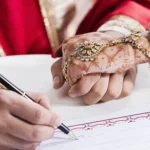Procedure Of Marriage Registration
Procedure Of Marriage Registration – we wish marriages to last till death is marriage. Since their birth, people start making plans for their children’s weddings. It is equally necessary to register the marriage legally in our country while organizing the wedding and enjoying the momentum. This will produce a marriage certificate that will be important for all legal and commercial endeavors. Therefore, it is crucial to grasp the marriage registration process to facilitate your own life.
Marriage is a big deal in India. A marriage certificate is also necessary for a separation, which is sad if things do not work out. The marriage certificate is also essential to submit an insurance claim if one of the partners passes away. Therefore, the most important and wisest course of action is to register a marriage and be familiar with the marriage registration process.
Step-By-Step Procedure To Register A Marriage In India
A marriage certificate is a legal declaration to the marriage of two persons. The Hindu Marriage Act of 1955 or the Special Marriage Act of 1954 must be in place to register marriages in India. The Honorable Supreme Court instructs that marriages in India must go under legal registration for the validation and consideration of the marriage.
Although the majority of individuals are aware that registering a marriage in India is necessary, many lack awareness of the process and end up either paying an agent too much or causing themselves too much hassle. Here is how to register a marriage in India both online and offline.
Online Registration For A Marriage Certificate
Online registration is more popular since it saves time and hassles, requires less waiting in line, and is especially convenient in today’s age of social isolation. Following are the steps.
- Access the home state applicant’s official government website
- Visit the website and look for the registration form for marriage there.
- Provide the form’s requested personal information for both parties to the marriage.
- You can submit the form when details are completed.
The marriage registrar will summon the applicant for a specific date and time after the form completion. You must arrive at the marriage registry office on time and with each of the supporting documents listed in the article below. Additionally, at the marriage registration office, two witnesses from each side must be present.
It is important to note that marriage registrar will provide the marriage date and time under the Hindu Marriage Act, 1955, is typically 15 to 30 days after the form is form submission. Additionally, the Special Marriage Act of 1954 specifies a 60-day waiting period.
Marriage Certificate With Online Registration
Under the Hindu Marriage Act, of 1955
In India, you can register your marriage under either the Special Marriage Act, 1954, or the Hindu Marriage Act, 1955. It is applies to all citizens of Indian, regardless of their cast or religion. Only those who identify as Hindus, Sikhs, Jains, or Buddhists are eligible to apply to have their marriage registered in India. The couple may also apply for registration if their union has previously been solemnized.
It is necessary to go to the sub-office registrar’s where the marriage was performed. The sub-office, registrar’s where one of the partners should be residing for more than six months, is where it is possible to complete it. You can perform a marriage under religious celebrations, traditions and rituals of either party.
Under The Special Marriage Act, Of 1954
- The marriage official grants the couple registration and solemnization under this. As previously mentioned, the couple applying under the Special Marriage Act must give the sub-registrar under whose jurisdiction either of the partners resides 30 days’ notice.
- If the registrar does not receive an objection within that time after posting a notice on the board for 30 days, the marriage is registered. The notice must be kept on file by the jurisdiction’s sub-registrar.
- Without a religious ceremony, the marriage might be consummated through the entire procedure. For people who are ineligible to register their marriage under the Hindu marriage legislation in India, the Special Marriage Act, of 1954 offers an alternative.
Required Documents For Marriage Registration
- An official birth certificate. The proof of identity can be a passport, birth certificate, or matriculation certificate. Male applicants for marriage licenses must be 21 years old, and female applicants must be 18 years old. Both the Special Marriage Act of 1954 and the Hindu Marriage Act of 1955 are affected by this.
- Residential evidence for both parties. It may take the shape of a power bill, ration card, PAN card, Aadhar card, or voter identification from an election.
- A certificate from the institution recognizing the marriage’s solemnization if the union was solemnized at a place of worship.
- If the marriage is registered under the Hindu Marriage Act of 1955 or the Special Marriage Act of 1954, the district cashier must receive payments of Rs. 100 or Rs. 150. The application form must be sent with the payment receipt attached.
- Two photographs, one each of the husband and wife, in passport size. And one final picture in case the union has already been sealed.
- The wedding invitation card, should the union be solemnized.
- Both parties must affirm that they are not connected to or involved in any relationship that is forbidden under the Hindu Marriage Act of 1955 or the Special Marriage Act of 1954.
- An authenticated copy of the divorce decree or death certificate must be included with the application form if one of the parties is divorced or a widow.
- The application form must be accompanied by an affidavit stating the location, date, and time of the marriage, as well as the parties’ marital status and nationalities.
- Two witnesses from the wedding must be present at the meeting in the sub-office registrars in case the marriage is solemnized.
Take Away
The most trustworthy and knowledgeable lawyer in Chandigarh for marriage registration is Advocate Amit Gupta. We swear to always be completely honest with our clients and put their needs first. In Chandigarh, Haryana, Punjab, and Himachal State, where we have more than ten years of experience and skill, we have a sizable customer.
For help with love marriages, court marriages, marriage protection, family disputes, and much more, get in touch with us. We adhere to a stricter code of confidentiality and vehemently defend the notion of the attorney-client privilege. Employees need to follow the “clean desk” policy at the start and conclusion of each workday. Moreover they do not have permission to bring any paper or storage items with them outside of the office.







